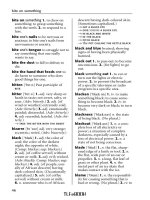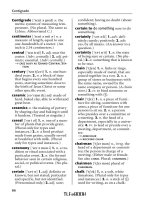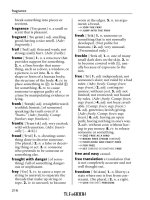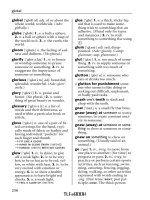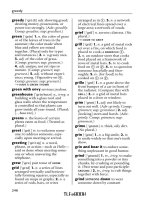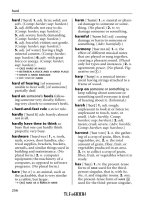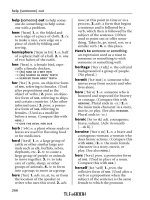NTC''''s Pocket Dictionary of Words and Phrases part 60 potx
Bạn đang xem bản rút gọn của tài liệu. Xem và tải ngay bản đầy đủ của tài liệu tại đây (248.13 KB, 10 trang )
doing what one has been doing
and leave, go to bed, etc. (Figura-
tive.)
sign off on
something
to sign a
paper, indicating that one has fin-
ished with something or agrees
with the state of something.
sign on to announce the beginning
of a broadcast transmission.
sign on the dotted line to place
one’s signature on a contract or
other important paper.
sign
one’s
own death warrant to
do something that ensures the fail-
ure of one’s endeavors.
sign out to indicate in writing that
one is leaving or going out tem-
porarily.
sign
someone
in to record that
someone has arrived somewhere
and at what time by recording the
information on a paper or a list.
sign
someone
out (of
someplace
)
to make a record of someone’s
departure from someplace.
sign
someone
up (for
something
)
to record the agreement of some-
one to participate in something.
sign
someone
up (with
someone or
something
) to record the agree-
ment of someone to join a group
of people or an organization.
sign
something
away to sign a
paper in which one gives away
one’s rights to something.
sign
something
in to record that
something has been received at a
particular time by recording the
information on a paper or a list.
sign
something
out (of
someplace
)
to make a record of the borrowing
of something from someplace.
sign
something
over (to
someone
)
to sign a paper granting the rights
to or ownership of something to a
specific person.
sign up (for
something
) to record
one’s agreement to participate in
something.
signal ["sIg n@l] 1. n. something
that conveys a message by affect-
ing one of the senses; a sound,
light, movement, etc., that conveys
a message.
2. n. the waves sent by
a radio or television transmitter.
3. tv. to indicate something. (The
object can be a clause with
that
U.)
signal to
someone
to
do something
[for someone] to give someone a
command or instruction using a
signal.
signature ["sIg n@ tS#] n. a person’s
name, handwritten by the person.
signed ["saInd] adj. marked with
someone’s signature.
signed, sealed, and delivered
formally and officially signed; [for
a formal document to be] exe-
cuted.
significance [sIg "nIf @ k@ns] n.
importance; meaning. (No plural.)
significant [sIg "nIf @ k@nt] adj.
important; having meaning. (Adv:
significantly.)
signify ["sIg n@ faI] tv. to mean
something; to indicate something;
to be a sign of something. (The
object can be a clause with
that
U.)
sign off on something
556
08 7/23/03 8:50 AM Page 556
TLFeBOOK
silence ["saI l@ns] 1. n. absolute
quiet; the absence of all sound.
(No plural.)
2. n. the absence of
comments about something. (No
plural.)
3. tv. to cause someone to
be quiet; to cause someone to stop
talking or to stop making noise.
silent ["saI l@nt] 1. adj. quiet; not
speaking or making noise; done
without making noise. (Adv:
silently.)
2. adj. [of a (spelling) let-
ter] not pronounced; not repre-
senting a sound. (Adv: silently.)
silk ["sIlk] 1. n. a smooth, fine
thread that is created by a silk-
worm when making its cocoon.
(No plural.)
2. n. cloth woven
from Q. (Plural only for types
and instances.)
3. adj. made of W.
→
make a silk purse out of a sow’s
ear
silkworm ["sIlk w#m] n. a creature
that makes a cocoon of silk.
silky ["sIl ki] adj. like silk; soft and
smooth; [of cloth] soft and shim-
mering. (Adv: silkily. Comp:
silkier; sup: silkiest.)
sill ["sIl] n. the bottom ledge of a
window or door frame.
→
windowsill
silly ["sIl i] adj. foolish; not sensible.
(Comp: sillier; sup: silliest.)
silly season the time of year, usu-
ally in the summer, when there is a
lack of important news and news-
papers contain articles about
unimportant or trivial things
instead.
silver ["sIl v#] 1. n. a bright, white,
valuable metallic element, which
in its pure form is soft and easily
shaped. (No plural.)
2. n. coins,
rather than paper money. (From a
time when major U.S. coins were
made of Q. No plural.)
3. adj.
made of Q.
→
born with a silver spoon in
one’s
mouth
silverware ["sIl v# wEr] 1. n. eat-
ing or serving utensils that are
made from or plated with silver.
(No plural.)
2. n. knives, forks,
and spoons made of steel, nickel,
or metals other than silver. (No
plural.)
silvery ["sIl v@ ri] adj. looking like
silver.
similar ["sIm @ l#] adj. resembling
something else, but not exactly the
same. (Adv: similarly.)
similarity [sIm @ "lEr I ti] n. a way
or an aspect in which someone or
something is like or resembles
someone or something else.
simmer ["sIm #] 1. tv. to boil
something gently; to cook some-
thing at or just below its boiling
point.
2. iv. to boil gently; to cook
at or just below the boiling point.
3. iv. to be angry without letting
other people know that one is
angry. (Figurative on W.)
4. iv.
[for a situation] to be currently
somewhat calm but progressing
toward violence.
simple ["sIm p@l] 1. adj. easy; not
complicated; not complex. (Adv:
simply. Comp: simpler; sup: sim-
plest.)
2. adj. plain; not compli-
cated; not fancy. (Adv: simply.
Comp: simpler; sup: simplest.)
simplicity [sIm "plIs I ti] n. the
quality of being simple or not
complicated. (No plural.)
simplify ["sIm pl@ faI] tv. to make
something simpler; to make some-
simplify
557
08 7/23/03 8:50 AM Page 557
TLFeBOOK
thing easier to do or understand;
to make something clearer.
simplistic [sIm "plIs tIk] adj. too
simple; having been simplified too
much. (Adv: simplistically [
Ik
li
].)
simply ["sIm pli] 1. adv. easily;
without difficulty.
2. adv. merely;
only.
3. adv. absolutely; com-
pletely; very.
simulate ["sIm j@ let] tv. to show
the nature or effects of something,
allowing the observer to learn
about it without experiencing it.
simulation [sIm j@ "le S@n] 1. n. a
demonstration of the nature or
effects of an event without anyone
really experiencing it.
2. n. some-
thing that has been simulated.
simultaneous [saI m@l "te ni @s]
adj. happening or existing at the
same time. (Adv: simultaneously.)
sin ["sIn] 1. n. evil; something that
is wicked or wrong; an act that is
in opposition to a religious or
moral principle. (Plural only for
types and instances.)
2. iv. to
break a religious or moral princi-
ple.
since ["sIns] 1. conj. from a certain
time in the past until now.
2. conj.
because.
3. prep. from a certain
time in the past until now.
4. adv.
from a certain time in the past
until now.
since time immemorial since a
very long time ago.
sincere [sIn "sIr] adj. honest; real;
genuine; true. (Adv: sincerely.
Comp: sincerer; sup: sincerest.)
sincerely [sIn "sIr li] 1. adv. hon-
estly; really; genuinely; truly.
2. adv. a word used as a polite way
to finish a letter, before one’s sig-
nature.
sincerity [sIn "sEr I ti] n. the qual-
ity of being sincere; honesty. (No
plural.)
sinful ["sIn fUl] 1. adj. full of sin;
having committed a sin. (Adv:
sinfully.)
2. adj. wicked; bad; evil;
leading people into sin. (Adv:
sinfully.)
sing ["sIN] 1. iv., irreg. to make
music with one’s voice, uttering a
melody with words. (Past tense:
sang; past participle: sung.) 2. tv.,
irreg. to make music as in Q.
sing out to sing more loudly.
sing
someone’s
praises to praise
someone highly and enthusiasti-
cally.
sing
something
out to sing or
announce something loudly.
singe ["sIndZ] tv. to burn some-
thing slightly; to burn the edge or
end of something.
single ["sIN g@l] 1. adj. one and
only one. (Adv: singly.)
2. adj.
individual; meant for one thing or
person. (Adv: singly.)
3. adj. not
married. (Adv: singly.)
4. adj. hav-
ing only one part; not double; not
multiple. (Adv: singly.)
5. n. some-
thing that is meant for one person.
6. n. a $1 bill. 7. n. someone who is
not married.
single
someone or something
out
(for
something
) to choose or pick
someone or something for some-
thing; to select an eligible person
or thing for something.
simplistic
558
08 7/23/03 8:50 AM Page 558
TLFeBOOK
single-minded ["sIN g@l "maIn dId]
adj. having only one purpose.
(Adv: single-mindedly.)
singular ["sIN gj@ l#] 1. adj. refer-
ring to only one person or thing;
the opposite of
plural. 2. adj.
unusual; exceptional; remarkable.
(Adv: singularly.)
3. n. the form of
a noun that refers to only one per-
son or thing; the opposite of
plural.
sink ["sINk] 1. iv., irreg. to go
beneath a surface; to fall beneath a
surface. (Past tense:
sank or sunk;
past participle: sunk.) 2. iv., irreg.
to become smaller in number; to
decrease.
3. iv., irreg. [for some-
one] to collapse or fall to the
ground because of weakness, fear,
respect, etc.
4. tv., irreg. to cause
something to go lower and lower
beneath the surface of water or
some other liquid.
5. n. a perma-
nent hollow bowl or basin, espe-
cially in a kitchen or bathroom,
for washing dishes, one’s hands or
face, etc.
→
desert a sinking ship
→ everything but the kitchen sink
→ leave a sinking ship
sink back (into
something
) to lean
back and relax in something, such
as a soft chair.
sink down to sink or submerge.
sink in(to
someone or something
)
to penetrate someone or some-
thing. (Used figuratively in refer-
ence to someone’s brain or
thinking.)
sink
one’s
teeth into
something
1. to take a bite of some kind of
food, usually a special kind of
food.
2. to get a chance to do,
learn, or control something.
sink or swim either fail or succeed.
sink
something
in((to)
someone or
something
) 1. to drive or push
something into someone or some-
thing.
2. to invest time or money
in someone or something. (Some-
times implying that it was wasted.)
sinking ["sIN kIN] adj. going further
downward into a liquid.
sinner ["sIn #] n. someone who
sins.
sinus ["saI n@s] 1. n. one of a num-
ber of spaces inside the bones of
the face that are connected to the
outside air by way of the nose.
2. the adj. use of Q.
sip ["sIp] 1. tv. to drink something a
little bit at a time.
2. n. a small
drink of something; a little taste of
something liquid.
siphon and syphon ["saI f@n] n. a
tube that has one end in a con-
tainer of liquid and, through pres-
sure and gravity, pulls the liquid
downward into another container
placed at a lower level.
siphon
something
(off) to remove
liquid from a container by using a
siphon.
sir ["s#] n. a word used to address a
male politely.
siren ["saI r@n] n. a device that
makes a loud noise of warning,
such as that found on police cars,
fire trucks, and ambulances.
sissy ["sIs i] n. a weak and shy boy;
a boy who behaves like a girl.
(Derogatory.)
sissy
559
08 7/23/03 8:50 AM Page 559
TLFeBOOK
sister ["sIs t#] 1. n. a female sib-
ling; a daughter of one’s mother or
father.
2. n. a nun. (Also a term of
address. Capitalized when written
as a proper noun.)
sit ["sIt] 1. iv., irreg. to be in a posi-
tion where the upper part of the
body is straight, and the buttocks
are supported by a chair, a seat,
the floor, or some other surface.
(Past tense and past participle:
sat.) 2. iv., irreg. [for something]
to be in a certain position; to be in
a place.
3. iv., irreg. [for an ani-
mal] to be positioned with the
back end resting on a surface.
4. tv., irreg. to make someone sit
as in Q in a location.
→
like a sitting duck
sit around to relax sitting; to waste
time sitting.
sit around (
somewhere
) to sit
somewhere and relax or do noth-
ing; to sit idly somewhere.
sit at
someone’s
feet to admire
someone greatly; to be influenced
by someone’s teaching; to be
taught by someone.
sit back to push oneself back in
one’s seat; to lean against the back
of one’s seat.
sit down to be seated; to sit on
something, such as a chair.
sit in (for
someone
) to act as a sub-
stitute for someone.
sit in (on
something
) to attend
something as a visitor; to act as a
temporary participant in some-
thing.
sit on
its
hands [for an audience]
to refuse to applaud.
sit on
one’s
hands to do nothing;
to fail to help.
sit on the fence not to take sides
in a dispute; not to make a clear
choice between two possibilities.
sit (
something
) out to elect not to
participate in something.
sit through
something
to remain
seated and in attendance for all of
something.
sit tight to wait; to wait patiently.
(Does not necessarily refer to sit-
ting.)
sit up
1.
to rise from a lying to a
sitting position.
2. to sit straighter
in one’s seat; to hold one’s posture
more upright while seated.
sit up and take notice to become
alert and pay attention.
sit up with
someone
to remain
awake and attend someone
throughout the night.
site ["saIt] n. a location where
something is, or was happening,
has happened, or will happen.
sitting on a powder keg in a
risky or explosive situation; in a
situation where something serious
or dangerous may happen at any
time.
sitting target someone or some-
thing in a position that is easily
attacked.
situate ["sIt Su et] tv. to place
something; to have or make a
place for something.
situation [sIt Su "e S@n] n. a condi-
tion; the circumstances of an
event; a state of affairs.
six ["sIks] 6. Go to four.
→
at sixes and sevens
sister
560
08 7/23/03 8:50 AM Page 560
TLFeBOOK
six of one and half a dozen of
the other
about the same one
way or another.
six-pack ["sIks pAk] n. a package of
six things, especially six cans of
beer or soft drinks.
sixteen ["sIks "tin] 16. Go to four.
sixteenth ["sIks "tinT] 16th. Go to
fourth.
sixth ["sIksT] 6th. Go to fourth.
sixth sense a supposed power to
know or feel things that are not
perceptible by the five senses of
sight, hearing, smell, taste, and
touch.
sixtieth ["sIks ti @T] 60th. Go to
fourth.
sixty ["sIks ti] 60. Go to forty.
sizable ["saIz @ b@l] adj. large;
rather large; much. (Adv: sizably.)
size ["saIz] 1. n. the degree to
which someone or something is
large or small. (No plural.)
2. n.
one measurement in a series of
measurements, used to describe Q
of a product one wants, such as an
article of clothing, a portion of
food or drink, certain hardware,
etc.
size
someone or something
up to
scrutinize someone or something
and form a judgment.
sizzle ["sIz @l] 1. n. the hissing
noise made when frying fat or fry-
ing food in fat. (No plural.)
2. iv.
[for fat or cooking oil] to make a
hissing noise when it is fried; to
sound like fat when it fries.
sizzling ["sIz lIN] 1. adj. frying;
making the noise that fat does
when it is heated.
2. adj. very hot.
skate ["sket] 1. n. an ice skate; a
roller skate. 2. iv. to move (over a
surface) while wearing
ice skates
or roller skates.
→
ice skate
→ roller skate
skate on thin ice to be in a risky
situation.
skater ["sket #] n. someone who
ice-skates or roller-skates.
skeleton ["skEl @ t@n] 1. n. the
bones of a person or an animal,
usually connected in their proper
arrangement.
2. n. an outline; the
basic structure that supports
something. (Figurative on Q.)
skeleton in the closet a hidden
and shocking secret; a secret fact
about oneself.
skeptic ["skEp tIk] n. someone who
doubts faith, claims, theories, or
facts; someone who questions the
truth of something, especially reli-
gion.
skeptical ["skEp tI k@l] adj. doubt-
ing; questioning; finding some-
thing hard to believe. (Adv:
skeptically [
Ik li].)
skepticism ["skEp t@ sIz @m] n.
doubt; the condition of being
skeptical; skeptical attitude or
behavior. (No plural.)
sketch ["skEtS] 1. n. a simple draw-
ing; a rough drawing that is
quickly made.
2. n. a brief
description; an outline.
3. n. a
short skit; a very short play that is
usually funny.
4. tv. to draw some-
one or something roughly and
quickly; to make a quick drawing.
5. iv. to draw roughly and quickly.
→
thumbnail sketch
sketch
561
08 7/23/03 8:50 AM Page 561
TLFeBOOK
sketchy ["skEtS i] adj. not complete;
without details. (Adv: sketchily.
Comp: sketchier; sup: sketchiest.)
ski ["ski] 1. n. one of two long, nar-
row, thin strips of wood or plastic
used to travel on the surface of
snow or water.
2. iv. to move on
the surface of snow or water on a
pair of Q.
skid ["skId] 1. iv. [for a wheel of a
vehicle] to continue to move over
a surface after the brakes have
been applied.
2. iv. to slip forward
or sideways while moving.
3. n. a
forward or sideways slipping
movement as with Q or W.
skier ["ski #] n. someone who skis
on water or snow.
skiing ["ski IN] n. the sport or activ-
ity of moving over snow or water
on skis. (No plural.)
skill ["skIl] n. the ability to do
something well, especially because
of talent, experience, or practice.
skilled ["skIld] adj. having skill;
experienced.
skillet ["skIl @t] n. a shallow pan
used for frying foods.
skillful ["skIl fUl] adj. having skill;
experienced; able to do something
very well. (Adv: skillfully.)
skim ["skIm] 1. tv. to remove some-
thing from the surface of a liquid.
2. tv. to glide over the surface of
something; to go over the surface
of something quickly.
3. tv. to scan
reading material; to read some-
thing quickly.
skim over
something
1. to glide
over the surface of something,
without touching it.
2. to read
something quickly but not care-
fully.
skim through
something
to go
through something hastily; to read
through something hastily.
skin ["skIn] 1. n. the outer covering
of humans and most animals; the
outer covering of many fruits and
vegetables. (Plural only for types
and instances.)
2. tv. to remove
the skin from something.
→
all skin and bones
→ by the skin of
one’s
teeth
→ get under
someone’s
skin
→ jump out of
one’s
skin
→ no skin off
someone’s
nose
→ no skin off
someone’s
teeth
→ nothing but skin and bones
skinny ["skIn i] adj. very thin; with-
out much fat. (Comp: skinnier;
sup: skinniest.)
skip ["skIp] 1. iv. to move so that
one takes a step with one foot,
hops on that foot, takes a step with
the second foot, and then hops on
the second foot, repeatedly.
2. tv.
to pass someone or something
over; to omit something.
3. tv. to
avoid attending a school class or
other event and go someplace else.
skip about and skip around to
move in a random order; to be
random in doing things.
skip around Go to skip about.
skip over
someone or something
Go to skip past
someone or something.
skip past
someone or something
and skip over
someone or some-
thing
to pass over someone or
something.
skip rope to jump over an arc of
rope that is passed beneath one’s
sketchy
562
08 7/23/03 8:50 AM Page 562
TLFeBOOK
feet then over one’s head, repeat-
edly.
skirmish ["sk# mIS] n. a small bat-
tle or argument.
skirt ["sk#t] 1. n. an item of
women’s clothing that wraps
around the waist and hangs down,
without separate sections for each
leg.
2. tv. to move along the edge
of something; not to move
through the center of something.
3. tv. to evade an issue, topic, or
question; to fail to address an
issue, topic, or question.
skit ["skIt] n. a short performance
that is usually funny or that
addresses a certain topic.
skull ["sk^l] n. the bones of the
head; the bones that protect the
brain.
→
get
something
through
someone’s
thick skull
skunk ["sk^Nk] n. a small animal
that has black fur with a white
stripe down its back and a bushy
tail, and that releases a very bad
smell when attacked or frightened.
sky ["skaI] n. the space above the
earth; the air above the earth.
(Sometimes plural.)
→
(as) high as the sky
→ out of a clear blue sky
→ pie in the sky
skydive ["skaI daIv] 1. iv. to jump
from an airplane, fall through the
air, and then open a parachute.
(Past tense and past participle:
skydived.)
2. n. an instance of
jumping from an airplane as in Q.
skylight ["skaI laIt] n. a window in
the roof or ceiling of a building.
The
sky’s the limit. There is no
limit to the success that can be
achieved or the money that can be
gained or spent.
skyscraper ["skaI skre p#] n. a
very tall building.
slab ["slAb] n. a thick slice of some-
thing; a thick, flat piece of some-
thing.
slack ["slAk] 1. adj. loose; not tight;
not taut. (Adv: slackly. Comp:
slacker; sup: slackest.)
2. adj. not
strict; relaxed. (Figurative on Q.
Adv: slackly. Comp: slacker; sup:
slackest.)
3. adj. not active; not
busy. (Adv: slackly. Comp: slacker;
sup: slackest.)
4. n. looseness; a
part of something that is not
pulled tight.
slack off to be lazy; to work only
when absolutely necessary; to
wane or decline; to decrease in
intensity.
slacken ["slAk @n] iv. to reduce,
especially in speed or tightness; to
become slower or looser.
slacks n. pants; trousers. (Treated
as plural. Number is expressed
with pair(s) of slacks. Also counta-
ble. Rarely singular.)
slain ["slen] past participle of slay.
slam ["slAm] 1. tv. to shut some-
thing noisily and with force.
2. tv.
to insult or criticize someone or
something very strongly. (Infor-
mal.)
3. iv. [for something] to shut
very noisily and with force.
4. n. a
loud and violent closing or crash.
slam into
someone or something
to
run into someone or something
very forcefully; to crash into
someone or something with great
force.
slam into someone or something
563
08 7/23/03 8:50 AM Page 563
TLFeBOOK
slam
someone or something
against
someone or something
to
shove someone or something
against someone or something.
slander ["slAn d#] 1. n. a spoken
or written lie that is meant to hurt
someone’s reputation; something
false that is said in order to hurt
someone’s reputation. (No plural.)
2. tv. to damage someone’s reputa-
tion by lying about that person.
slanderous ["slAn d# @s] adj.
understood or intended to be slan-
der. (Adv: slanderously.)
slang ["slAN] 1. n. words or expres-
sions that are not expected in for-
mal, educational, or business
settings. (Not usually plural.)
2. the adj. use of Q.
slant ["slAnt] 1. n. a slope; an
angle. (No plural.)
2. iv. to slope;
to angle; to move at an angle; to
rise or fall while moving in a cer-
tain direction.
3. tv. to cause
something to be angled; to cause
something to move at an angle.
4. tv. to express something in a
way that favors one point of view
over another.
slap ["slAp] 1. tv. to hit someone or
something with one’s open hand;
to hit someone or something with
something flat.
2. tv. to put some-
thing on a surface carelessly and
with force.
3. n. a hit with one’s
open hand or with something flat.
4. n. the noise made when some-
one or something is hit with some-
one’s open hand or with some-
thing flat.
slap in the face an insult; an act
that causes disappointment or dis-
couragement.
slap
something
on to dress in
something hastily.
slap
something
on(to
someone or
something
) to place something
onto someone or something by
slapping.
slap
something
together to make
up something very quickly.
slash ["slAS] 1. tv. to cut something
violently with a sharp object,
using large, sweeping movements.
2. tv. to reduce numbers or
amounts greatly.
3. n. a cut made
by a violent movement as in Q; a
gash.
4. n. the (/) symbol; the (\)
symbol.
slate ["slet] 1. n. a rock that splits
easily into flat, thin layers. (No
plural.)
2. n. a group of candidates
offered by a political party in an
election.
3. adj. made of Q.
→
start (off) with a clean slate
slaughter ["slO t#] 1. tv. to kill and
cut up an animal for food.
2. tv. to
kill living creatures ruthlessly.
→
like a lamb to the slaughter
→ like lambs to the slaughter
slave ["slev] n. someone who is
owned by someone else; someone
who is the property of someone
else.
→
be a slave to
something
slavery ["slev (@) ri] n. the owner-
ship of slaves. (No plural.)
slay ["sle] tv., irreg. to kill someone
or some animal; to murder some-
one. (Past tense:
slew; past partici-
ple:
slain.)
slaying ["sle IN] n. a murder; the
killing of someone or some ani-
mal.
slam someone or something against someone or something
564
08 7/23/03 8:50 AM Page 564
TLFeBOOK
sleazy ["sli zi] adj. cheap and crude;
having a bad reputation. (Adv:
sleazily. Comp: sleazier; sup: sleazi-
est.)
sled ["slEd] 1. n. a flat platform
attached to long, thin blades that
move easily over snow.
2. iv. to
ride somewhere on Q; to play
with Q; to travel by Q.
sleek ["slik] 1. adj. smooth and
shiny. (Especially used to describe
hair or fur—of people or ani-
mals—that is healthy or well cared
for. Adv: sleekly. Comp: sleeker;
sup: sleekest.)
2. adj. having neat,
smooth lines; stylish. (Adv: sleekly.
Comp: sleeker; sup: sleekest.)
sleep ["slip] 1. n. the period of rest
when the mind is not conscious;
the period of rest when the body is
not awake. (No plural.)
2. iv.,
irreg. not to be awake; to rest the
body and mind in an unconscious
condition. (Past tense and past
participle:
slept.) 3. tv., irreg. to
provide space for a certain num-
ber of people to
sleep as in W; to
have enough space for a certain
number of people to
sleep as in W.
→
doze off (to sleep)
→ lull
someone
to sleep
→ not sleep a wink
→ put
someone or some creature
to sleep
→ put
someone
to sleep
sleep in to remain in bed, sleeping
past one’s normal time of arising.
sleep like a log to sleep very
soundly.
sleep on
something
to think about
something overnight; to weigh a
decision overnight.
sleep
something
off to sleep away
the effect of alcohol or drugs.
sleep through
something
to
remain sleeping through some
event.
sleepless ["slip l@s] adj. without
sleep; unable to sleep. (Adv: sleep-
lessly.)
sleepwalk ["slip wOk] iv. to walk
while sleeping.
sleepwalker ["slip wOk #] n. some-
one who walks around while
sleeping.
sleepy ["slip i] adj. tired; drowsy;
needing to sleep. (Adv: sleepily.
Comp: sleepier; sup: sleepiest.)
sleet ["slit] 1. n. partly frozen rain;
partly frozen rain mixed with
snow or hail. (No plural.)
2. iv.
[for Q] to fall from the sky.
sleeve ["sliv] n. the part of an item
of clothing that covers the arm.
→
laugh up
one’s
sleeve
sleeveless ["sliv l@s] adj. without
sleeves. (Adv: sleevelessly.)
sleigh ["sle] n. a large sled; a plat-
form or carriage—usually pulled
by horses or dogs—attached to
long, metal blades for traveling
over snow.
slender ["slEn d#] adj. slim; thin,
in a pleasant or graceful way.
(Adv: slenderly. Comp: slenderer;
sup: slenderest.)
slept ["slEpt] past tense and past
participle of
sleep.
slew ["slu] 1. past tense of slay.
2. n. a large amount of something.
(Informal.)
slice ["slaIs] 1. n. a thin, flat piece
that is cut from something.
2. n. a
part; a portion; a share.
3. tv. to
cut a thin, flat piece from some-
slice
565
08 7/23/03 8:50 AM Page 565
TLFeBOOK
